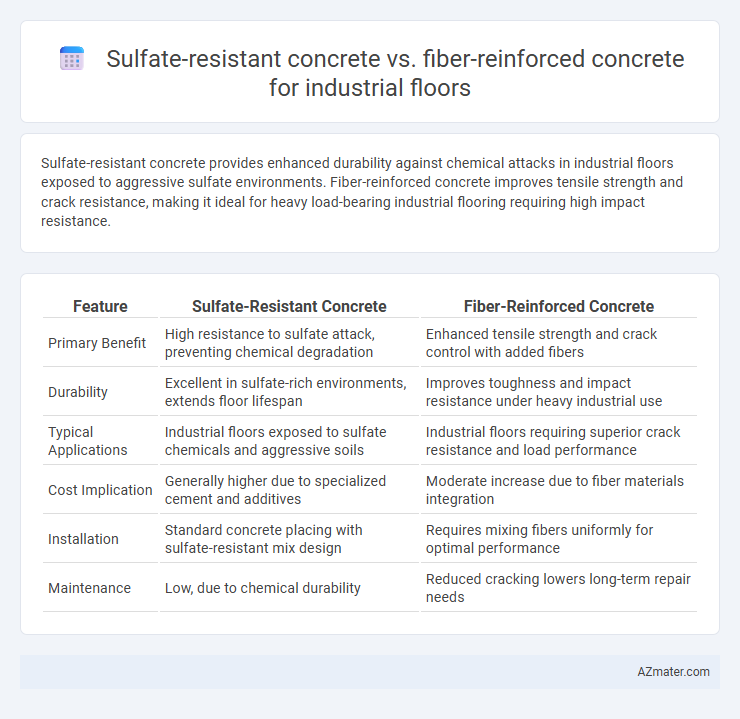Sulfate-resistant concrete provides enhanced durability against chemical attacks in industrial floors exposed to aggressive sulfate environments. Fiber-reinforced concrete improves tensile strength and crack resistance, making it ideal for heavy load-bearing industrial flooring requiring high impact resistance.
Table of Comparison
| Feature | Sulfate-Resistant Concrete | Fiber-Reinforced Concrete |
|---|---|---|
| Primary Benefit | High resistance to sulfate attack, preventing chemical degradation | Enhanced tensile strength and crack control with added fibers |
| Durability | Excellent in sulfate-rich environments, extends floor lifespan | Improves toughness and impact resistance under heavy industrial use |
| Typical Applications | Industrial floors exposed to sulfate chemicals and aggressive soils | Industrial floors requiring superior crack resistance and load performance |
| Cost Implication | Generally higher due to specialized cement and additives | Moderate increase due to fiber materials integration |
| Installation | Standard concrete placing with sulfate-resistant mix design | Requires mixing fibers uniformly for optimal performance |
| Maintenance | Low, due to chemical durability | Reduced cracking lowers long-term repair needs |
Introduction to Industrial Flooring Solutions
Sulfate-resistant concrete is designed to withstand chemical attacks in aggressive environments, making it ideal for industrial floors exposed to sulfate-rich soils or wastewater. Fiber-reinforced concrete incorporates synthetic or steel fibers to improve tensile strength, crack resistance, and durability under heavy mechanical loads commonly found in industrial settings. Selecting the appropriate industrial flooring solution depends on environmental conditions and structural requirements to ensure long-lasting performance and reduced maintenance costs.
Understanding Sulfate-Resistant Concrete
Sulfate-resistant concrete for industrial floors is engineered with low C3A cement content to withstand aggressive sulfate environments, ensuring durability in chemical-laden soils and wastewater areas. Its composition minimizes the formation of expansive compounds that cause cracking and spalling, which are common in environments exposed to sulfates. This type of concrete significantly extends the lifespan of industrial floors subjected to sulfate attack, maintaining structural integrity and reducing maintenance costs.
Overview of Fiber-Reinforced Concrete
Fiber-reinforced concrete (FRC) incorporates synthetic or steel fibers to enhance tensile strength, durability, and impact resistance, making it ideal for industrial floors subjected to heavy loads and dynamic stresses. Unlike sulfate-resistant concrete, which is chemically formulated to withstand sulfate-rich environments, FRC improves crack control and reduces spalling, extending the service life of industrial flooring. Its ability to distribute stresses more evenly helps maintain structural integrity in demanding industrial applications.
Key Material Properties Comparison
Sulfate-resistant concrete is engineered to withstand aggressive sulfate environments, featuring low permeability and high sulfate ion resistance due to the use of sulfate-resistant cement with reduced C3A content. Fiber-reinforced concrete incorporates synthetic or steel fibers that enhance tensile strength, toughness, and crack resistance, improving durability under heavy mechanical loads. For industrial floors, sulfate-resistant concrete excels in chemical exposure durability, while fiber-reinforced concrete provides superior impact resistance and structural integrity under dynamic loading conditions.
Resistance to Chemical and Sulfate Attack
Sulfate-resistant concrete incorporates specialized cement types or additives that enhance durability against sulfate-induced chemical reactions, preventing expansion and cracking in industrial floors exposed to sulfate-rich environments. Fiber-reinforced concrete improves tensile strength and crack control, but its resistance to chemical and sulfate attack depends on the matrix and fiber type rather than intrinsic sulfate resistance. For industrial floors requiring high chemical and sulfate durability, sulfate-resistant concrete offers superior protection against aggressive sulfates, while fiber reinforcement primarily enhances structural integrity.
Mechanical Strength and Durability
Sulfate-resistant concrete exhibits superior chemical durability by resisting sulfate attack, ensuring long-term structural integrity in industrial floors exposed to aggressive soils or wastewater. Fiber-reinforced concrete enhances mechanical strength through improved tensile capacity and crack resistance, reducing maintenance and increasing load-bearing performance under heavy industrial traffic. Combining sulfate resistance with fiber reinforcement optimizes both durability against chemical degradation and mechanical resilience for industrial flooring applications.
Crack Control and Structural Integrity
Sulfate-resistant concrete offers enhanced durability in industrial floors exposed to aggressive sulfate environments, reducing chemical deterioration that leads to cracking and structural degradation. Fiber-reinforced concrete improves crack control by distributing tensile stresses throughout the matrix, significantly minimizing shrinkage cracks and enhancing impact resistance. Combining sulfate resistance with fiber reinforcement optimizes structural integrity and extends the service life of industrial flooring under severe mechanical and chemical conditions.
Installation Methods and Practical Considerations
Sulfate-resistant concrete requires precise mixing with low water-cement ratios and the use of Type V cement to prevent sulfate attacks, demanding careful curing and strict moisture control during installation to ensure durability in aggressive environments. Fiber-reinforced concrete involves integrating synthetic or steel fibers into the mix, which simplifies placement by reducing segregation and improving toughness, though attention must be given to proper fiber distribution and compaction to avoid weaknesses. Both materials necessitate specialized equipment for finishing and curing, with sulfate-resistant concrete often involving longer setting times and fiber-reinforced concrete benefiting from faster installation but requiring experience to maintain uniform fiber dispersion.
Cost Efficiency and Long-Term Maintenance
Sulfate-resistant concrete offers superior durability in chemically aggressive environments commonly found in industrial floors, reducing long-term repair costs and maintenance frequency. Fiber-reinforced concrete enhances structural integrity and crack control, which can decrease initial labor costs and improve lifespan, but may require specialized installation increasing upfront expenses. Balancing sulfate resistance with fiber reinforcement can optimize cost efficiency by minimizing both immediate investment and future maintenance needs.
Choosing the Best Concrete Type for Industrial Floors
Sulfate-resistant concrete offers superior durability in industrial floors exposed to harsh chemical environments, particularly where sulfate attack is prevalent, reducing structural degradation over time. Fiber-reinforced concrete enhances mechanical strength, impact resistance, and crack control, making it ideal for heavy-load applications with considerable mechanical stress. Selecting the best concrete type relies on assessing environmental sulfate exposure and mechanical load demands; sulfate-resistant concrete suits chemically aggressive settings, while fiber-reinforced concrete excels under mechanical wear and dynamic loads.

Infographic: Sulfate-resistant concrete vs Fiber-reinforced concrete for Industrial floor
 azmater.com
azmater.com